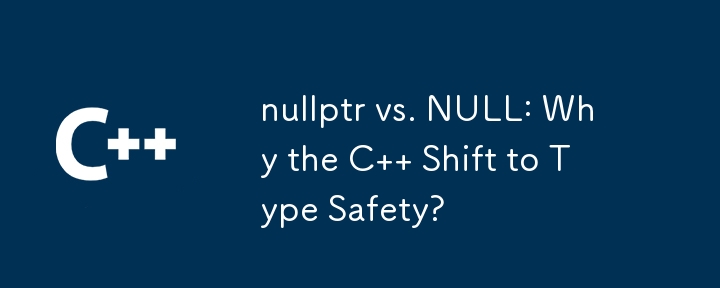nullptr vs. NULL: Why the C Shift to Type Safety?
Dec 11, 2024 am 06:41 AM
nullptr vs NULL: Why the Replacement?
In C , the nullptr keyword has replaced NULL for pointer-based applications. While both options denote a null pointer, nullptr offers advantages that make it the preferred choice.
Why Use nullptr Over NULL?
The primary reason for replacing NULL with nullptr is type safety. NULL is a macro defined as (void )0, which has a type of (void ). This broad type compatibility can lead to unintentional behavior, particularly in scenarios involving overloaded functions.
For example, consider the following function declarations:
If you call f with a NULL pointer, the compiler may be unable to determine which function overload to execute. This is because NULL can be implicitly converted to a pointer type, allowing it to match the second overload.
Advantages of nullptr
nullptr, on the other hand, has a distinct type of std::nullptr_t. When used in overload resolution, it only matches instances of std::nullptr_t or pointer types. This eliminates the ambiguity caused by the broader type compatibility of NULL.
Furthermore, nullptr ensures that the intention to use a null pointer is clearly expressed in the code.
Therefore, using nullptr over NULL provides increased type safety, prevents unintentional behavior in overloaded function calls, and enhances code clarity.
The above is the detailed content of nullptr vs. NULL: Why the C Shift to Type Safety?. For more information, please follow other related articles on the PHP Chinese website!

Hot Article

Hot tools Tags

Hot Article

Hot Article Tags

Notepad++7.3.1
Easy-to-use and free code editor

SublimeText3 Chinese version
Chinese version, very easy to use

Zend Studio 13.0.1
Powerful PHP integrated development environment

Dreamweaver CS6
Visual web development tools

SublimeText3 Mac version
God-level code editing software (SublimeText3)

Hot Topics
 What are the types of values returned by c language functions? What determines the return value?
Mar 03, 2025 pm 05:52 PM
What are the types of values returned by c language functions? What determines the return value?
Mar 03, 2025 pm 05:52 PM
What are the types of values returned by c language functions? What determines the return value?
 What are the definitions and calling rules of c language functions and what are the
Mar 03, 2025 pm 05:53 PM
What are the definitions and calling rules of c language functions and what are the
Mar 03, 2025 pm 05:53 PM
What are the definitions and calling rules of c language functions and what are the
 C language function format letter case conversion steps
Mar 03, 2025 pm 05:53 PM
C language function format letter case conversion steps
Mar 03, 2025 pm 05:53 PM
C language function format letter case conversion steps
 Where is the return value of the c language function stored in memory?
Mar 03, 2025 pm 05:51 PM
Where is the return value of the c language function stored in memory?
Mar 03, 2025 pm 05:51 PM
Where is the return value of the c language function stored in memory?
 How do I use algorithms from the STL (sort, find, transform, etc.) efficiently?
Mar 12, 2025 pm 04:52 PM
How do I use algorithms from the STL (sort, find, transform, etc.) efficiently?
Mar 12, 2025 pm 04:52 PM
How do I use algorithms from the STL (sort, find, transform, etc.) efficiently?
 How does the C Standard Template Library (STL) work?
Mar 12, 2025 pm 04:50 PM
How does the C Standard Template Library (STL) work?
Mar 12, 2025 pm 04:50 PM
How does the C Standard Template Library (STL) work?









